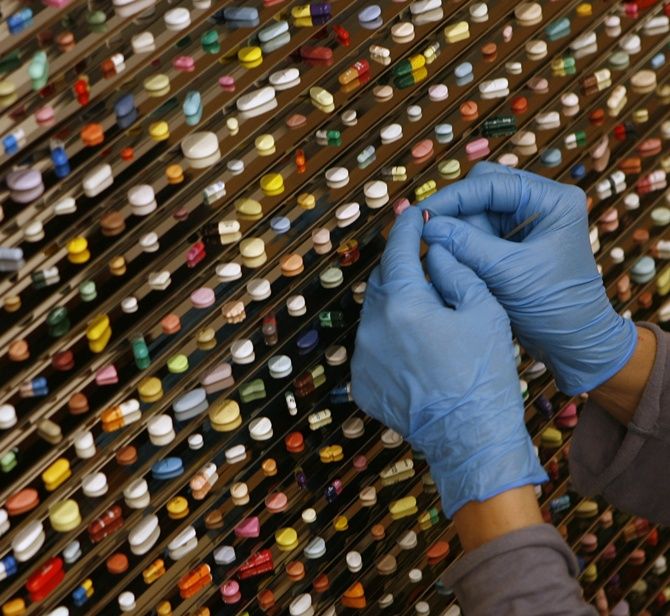 It's time for Indian generic companies to rethink their strategies, says Bhupesh Bhandari.
It's time for Indian generic companies to rethink their strategies, says Bhupesh Bhandari.
In July, the European Commission imposed fines of euro 427.7 million on Servier of France and five producers of generic medicine - Niche/Unichem, Matrix (it is now a part of Mylan) and Lupin of India, Teva of Israel, and Krka of Slovenia - for "concluding a series of deals aimed at protecting Servier's bestselling blood pressure medicine, perindopril, from price competition by generics in the European Union".
The commission said that Servier, through an acquisition and a series of patent settlements, was able to delay the entry of generic perindopril "to the detriment of public budgets and patients" in breach of European Union competition rules.
"Competitors cannot agree to share markets or market rents instead of competing, even when these agreements are in the form of patent settlements," commission Vice-President Joaquín Almunia said in a press release. "Such practices directly harm patients, national health systems and taxpayers. Pharmaceutical companies should focus their efforts on innovating and competing rather than attempting to extract extra rents from patients."
Lupin, which has been fined euro 40 million, and Unichem (euro 13.97 million) have said that they will contest the order in a European Union court. The ramifications of the verdict are wider. Patent settlement is an emerging - and perfectly acceptable - source of revenue for Indian generic companies. A large number of them have made successful patent challenges in the last few years. Some may be tempted to settle with the patent holder, rather than go through the process of launching the product, given the numerous instances of manufacturing lapses that have come to light in recent times.
The European Commission order shows that public sentiment is turning decisively against such settlements. Governments all over the world want to bring down the cost of healthcare. Generic medicine was supposed to be the way out: typically, the entry of a generic alternative brings the price of the drug crashing down by 85 to 90 per cent.
Some countries have allowed chemists to switch expensive medicine prescribed by the doctor with a generic variant if it is available. Patent-holding innovator companies were the villains in that narrative. Now, even the generic companies are getting tarred with the same brush. The portents are ominous for Indian generic companies.
This isn't the first time that the European Commission has taken a negative view of the matter. In December 2013, it had imposed a fine of euro 16 million on Johnson & Johnson of the United States and Novartis of Switzerland for concluding "an anti-competitive agreement to delay the market entry of a cheaper generic version of the painkiller fentanyl in the Netherlands".
And in June 2013, it had fined Danish drug maker Lundbeck euro 93.8 million and a handful of generic companies another euro 52.2 million for agreements that led to delays in the market entry of cheaper generic versions of citalopram, Lundbeck's blockbuster anti-depressant. One of the generic companies found guilty by the commission was Ranbaxy, which was fined euro 10.32 million.
In the perindopril case, the commission has gone into some detail of how it works. Servier's patent for the molecule expired, for the most part, in 2003. It ring-fenced the drug with some secondary patents but these provided limited protection to what Servier called its "dairy cow", the July release said, and generic companies started preparing to enter the market. They had two options: use a non-patented technology to make generic perindopril or challenge some of the patents.
"There were very few sources of non-patented technology. In 2004, Servier acquired the most advanced one, forcing a number of generic projects to stop," said the release. "Servier recognised that this acquisition merely sought to 'strengthen the defence mechanism' and the technology was never put to use."
In addition, Servier, between 2005 and 2007, said the commission, did at least five settlements with generic companies that wanted to enter the market. One generic company acknowledged that it was being "bought out of perindopril", while another said that any settlement will have to be for "significant sums".
Another generic company was given the licence to sell in seven countries by Servier; in return, the company agreed to "sacrifice" all other European Union markets.
The generic version of perindopril was launched finally in 2007. In the United Kingdom, the price fell by 90 per cent. According to the commission, Servier's internal documents showed that it commented proudly on its "great success = 4 years won", referring to the expiry of the patent in 2003.
Even the United States Federal Trade Commission, or FTC, has taken a dim view of such settlements. It has challenged a number of patent settlements in court on the ground that these are anti-competitive and violate the United States antitrust laws. According to it, pay-for-delay deals, which postpone the entry of inexpensive generics, cost Americans $3.5 billion annually. An FTC study found that "patent settlements that include a payment delay generic entry by 17 months longer, on average, than those that do not include some form of payment".
A January 2013 FTC release said that drug companies made 40 potential pay-for-delay deals in FY2012 (October 1, 2011, to September 30 2012), up from 28 in FY2011. This was the highest ever since FTC started collecting such data in 2003.
"More and more brand and generic drug companies are engaging in these sweetheart deals," the release quoted then FTC chairman Jon Leibowitz as saying. "Unless this issue is resolved, we will all suffer the consequences of delayed generic entry - higher prices for consumers, businesses and the US taxpayer."
It's time for Indian generic companies to rethink their strategies.












 © 2025
© 2025